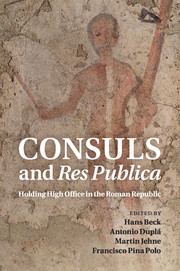Book contents
- Frontmatter
- Contents
- Preface
- Contributors
- The republic and its highest office: some introductory remarks on the Roman consulate
- Part I The creation of the consulship
- Part II Powers and functions of the consulship
- Chapter 4 Consular power and the Roman constitution: the case of imperium reconsidered
- Chapter 5 Consuls as curatores pacis deorum
- Chapter 6 The Feriae Latinae as religious legitimation of the consuls’ imperium
- Chapter 7 War, wealth and consuls
- Part III Symbols, models, self-representation
- Part IV Ideology, confrontation and the end of the republican consulship
- Bibliography
- Index of persons
- Subject index
Chapter 4 - Consular power and the Roman constitution: the case of imperium reconsidered
from Part II - Powers and functions of the consulship
Published online by Cambridge University Press: 07 September 2011
- Frontmatter
- Contents
- Preface
- Contributors
- The republic and its highest office: some introductory remarks on the Roman consulate
- Part I The creation of the consulship
- Part II Powers and functions of the consulship
- Chapter 4 Consular power and the Roman constitution: the case of imperium reconsidered
- Chapter 5 Consuls as curatores pacis deorum
- Chapter 6 The Feriae Latinae as religious legitimation of the consuls’ imperium
- Chapter 7 War, wealth and consuls
- Part III Symbols, models, self-representation
- Part IV Ideology, confrontation and the end of the republican consulship
- Bibliography
- Index of persons
- Subject index
Summary
“Why was it,” Plutarch asks in Roman Questions no. 80, “that when [the Romans] gave a public banquet for men who had celebrated a triumph, they formally invited the consuls and then sent word to them requesting that they not come to the dinner?” It was “because it was imperative that the place of honor at the table and an escort home after dinner should be assigned to the man who had triumphed. But these honors can be given to no one else when the consuls are present, but only to them.” Plutarch's Roman Questions are a hotchpotch of distinct cultural practices and traditional codes of behavior. Throughout long sections of the work, it appears to be a random collection of curiosities rather than a treatise that is geared toward a stringent analysis of typically Roman customs and socio-political institutions. But this does not undermine the work's value as a historical source. Beyond the actual information related (sparse as it may be, at times), the Roman Questions shed light on the silent assumptions of Roman political life. In his attempt to familiarize his readership with select political or social practices, Plutarch alludes to the very basic implications of those practices. Question no. 80 illustrates the case: the practice of inviting consuls to triumphal banquets and then telling them not to come appeared to be a peculiarity and hence was deemed worthy of relating. But it also discloses some of the most vital features of Roman political culture. It operates on the assumption that the consuls were the highest magistrates not only in the field (militiae) but also at home, within the sacred boundary of the city (domi). Whenever present, they were to be included in public events and preside over them. Moreover, while the consuls claimed the right of highest honor, the story makes it clear that there were other distinctions, such as a triumphator's rights and privileges, which under certain circumstances challenged the superior power of a consul, whether present or not. And third, Plutarch reveals that if such a conflict between authorities arose, the Romans were not shy about practical solutions that enabled them to navigate around the provisions of their constitution without actually abandoning it. The messenger sent to the consuls was a go-between that kept everyone's honor intact – at least as long as everybody played along.
- Type
- Chapter
- Information
- Consuls and Res PublicaHolding High Office in the Roman Republic, pp. 77 - 96Publisher: Cambridge University PressPrint publication year: 2011
- 7
- Cited by



